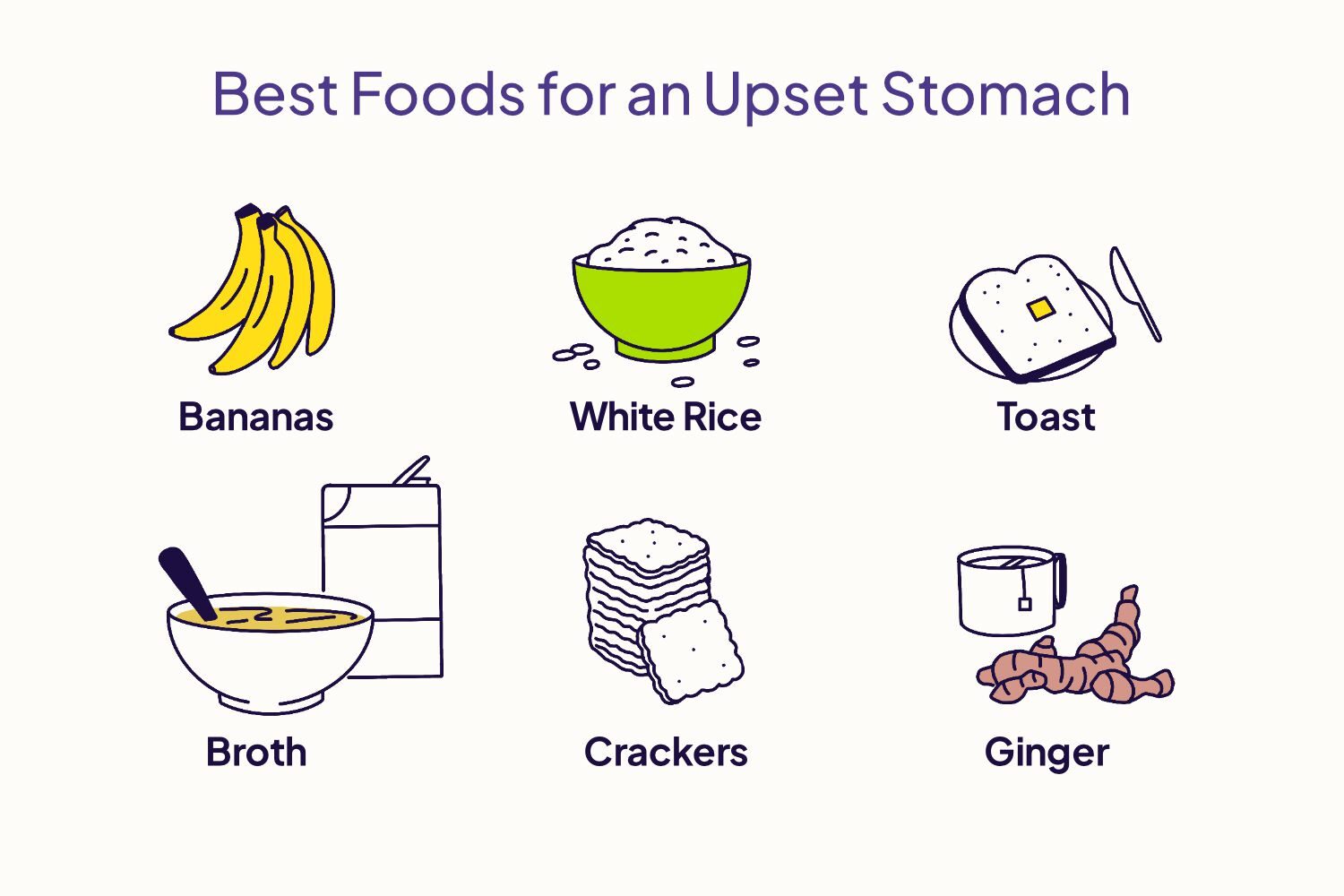Best and Worst Foods for Stomach Upsets: Ever felt that gnawing ache or the sudden urge to befriend the porcelain throne? Stomach upsets, also known as dyspepsia, are a common foe faced by warriors on the battlefield of life (a.k.a. everyone who eats food!).
While stomach upsets can be triggered by various culprits (think stress, medication, or even foodborne illness), what we put on our plates can significantly impact the duration and severity of these battles. So, the next time your stomach feels like it’s on a Tilt-a-Whirl ride, fear not! This guide will equip you with the knowledge to navigate the best and worst foods to soothe your tummy woes.
Foods That Befriend Your Upset Stomach

When your stomach’s feeling rough, think bland, easily digestible options. These gentle warriors provide soothing relief and help your digestive system get back on track. Here are some top picks:
1. The BRAT Diet
This acronym stands for Bananas, Rice, Applesauce, and Toast. These bland, starchy foods are easy to digest and can help settle nausea and diarrhea.
- Bananas: Rich in potassium, an electrolyte often depleted during stomach upsets, bananas help restore balance.
- Rice: Plain white rice is a gentle carbohydrate source that provides energy without irritating your gut.
- Applesauce: Unsweetened applesauce is a soothing option that provides mild hydration and some natural sweetness.
- Toast: Plain white toast is another easily digestible option that can help absorb excess stomach acid.
2. The Power of Probiotics
Probiotics are live bacteria that can help restore the balance of good and bad bacteria in your gut. This balance plays a crucial role in digestion. Opt for plain yogurt with live and active cultures (look for the label!) to reap the benefits.
3. Electrolyte Powerhouse
While often associated with childhood illnesses, Pedialyte and similar rehydration solutions can be a lifesaver for adults experiencing stomach upsets, especially those accompanied by vomiting or diarrhea. These solutions help replenish electrolytes lost due to fluid loss.
4. Ginger
Ginger is a natural remedy known for its anti-nausea properties. Sip on ginger tea, nibble on crystallized ginger, or add a touch of grated ginger to bland foods for some soothing relief.
5. Clear Broth
Clear broth, like chicken or vegetable broth, is a gentle and hydrating option. The warmth can be soothing for stomach cramps, and the broth provides some electrolytes and fluid to help with rehydration.
Foods to Avoid When Your Stomach’s in Distress

While some foods offer comfort, others can exacerbate stomach upset symptoms. It’s best to steer clear of these troublemakers until your tummy is feeling its best again:
1. Spicy Foods
Spicy foods can irritate your digestive system and worsen stomach cramps. Hold off on the hot sauce and fiery curries until your stomach is back to its fiery best (metaphorically speaking, of course!).
2. Fatty and Fried Foods
Fatty and fried foods are difficult to digest and can put a strain on your already struggling tummy. Opt for grilled, baked, or steamed options instead.
3. Dairy Products
Dairy products can be difficult to digest for some people, especially those experiencing lactose intolerance. Milk, cheese, and ice cream might be best saved for when your stomach is feeling sunny-side up.
4. Sugary Drinks and Processed Foods
Sugary drinks and processed foods can worsen diarrhea and can also contribute to inflammation. Opt for water and bland, whole foods to help your digestive system recover.
5. Caffeine and Alcohol
Caffeine and alcohol can irritate your stomach lining and worsen symptoms. Opt for herbal teas and water instead and save the alcoholic beverages for a time when your stomach is feeling celebratory, not upset.
Lifestyle Tweaks for Tummy Tranquility

While food plays a crucial role in managing stomach upsets, other lifestyle factors can also contribute to healing. Here are some additional tips:
- Hydration is Key: Stay hydrated by sipping on water or clear broths throughout the day. This helps replace fluids lost due to vomiting or diarrhea and keeps your digestive system functioning smoothly.
- Rest and Relaxation: Your body needs time to heal. Get plenty of rest and avoid strenuous activity until your stomach feels better.
- Small, Frequent Meals: Instead of large meals that can overwhelm your digestive system, opt for smaller, more frequent meals. This allows your body to focus on healing rather than digesting a heavy load.
- Listen to Your Body: Pay attention to how different foods affect you. If a particular food seems to trigger stomach upset symptoms, avoid it in the future.
- Consider a Heating Pad: Applying a heating pad to your stomach can provide some pain relief from cramping.
When to Call the Doctor

While most stomach upsets resolve on their own within a few days, there are situations where it’s best to seek medical attention. Here are some warning signs:
- Severe or persistent pain: If the pain is severe or doesn’t improve after a few days, consult your doctor.
- Bloody vomit or stool: This could indicate a more serious condition.
- Signs of dehydration: Extreme thirst, dizziness, or decreased urination could indicate dehydration, which requires medical attention.
- Fever: A high fever alongside stomach upset could signal an infection.
- Symptoms lasting more than a few days: If your stomach upset persists for more than a few days, it’s advisable to see a doctor to rule out any underlying issues.
Conclusion
Stomach upsets, though unpleasant, are a common part of life. By understanding the best and worst foods to consume during these episodes, along with some additional lifestyle tweaks, you’ll be well-equipped to navigate the discomfort and get your digestive system back on track. Remember, listen to your body, prioritize gentle foods, and don’t hesitate to seek medical attention if necessary. With a little knowledge and some TLC, you’ll be back to conquering culinary adventures in no time!
You May Also Like….
- Foods to Fight Acid Reflux and Heartburn
- Nutrient Rich Foods for Enhancing Cognitive Function
- Read the Health Benefit of Watermelon
FAQs
Q1: What are some natural remedies for nausea?
In addition to ginger, peppermint tea and chamomile tea can also provide some relief from nausea.
Q2: Can I take over-the-counter medications for stomach upset?
Certain over-the-counter medications, like Pepto-Bismol or Imodium, can help with symptoms like diarrhea or heartburn. However, consult your doctor before taking any medications, especially if you have any existing health conditions.
Q3: What if I have a food intolerance that triggers stomach upsets?
If you suspect a food intolerance (like lactose intolerance) is causing your stomach upset, keeping a food diary can help you identify the culprit. Consult a doctor or registered dietitian for guidance on managing food intolerances.
Q4: Is stress a factor in stomach upsets?
Stress can definitely play a role in digestive issues. Relaxation techniques like deep breathing or meditation can help manage stress and potentially alleviate stomach upset symptoms.
Q5: How can I prevent future stomach upsets?
Washing your hands regularly, practicing safe food handling techniques, and managing stress can all help reduce your risk of stomach upsets.

